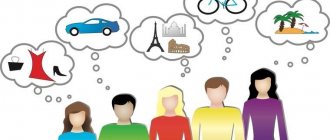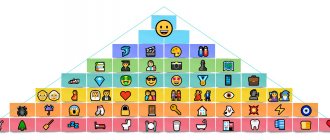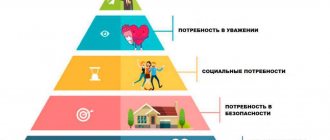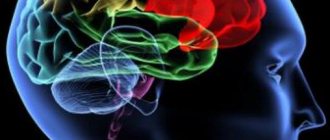Types of needs
Psychologists distinguish different types of needs:
- Biological . Natural desires for food, drink, breathing, excretion, reproduction, life in favorable climatic conditions, safety.
- Psychological . The desire for peace, communication or isolation, receiving aesthetic pleasure from the sights and sounds of nature and the surrounding world.
- Ethnic . Needs for the favorable existence of a particular ethnic group, procreation and nation.
- Labor . The need to work, engage in creative activities in order to ensure material well-being and develop mental activity.
- Economic . The need for material support in all spheres of life.
- Social . The need for social life, fulfillment of civic duty, communication with representatives of society. This also includes the desire to study cultural values and use them - museums, libraries, theaters, visiting cultural and historical places, etc.
Satisfying needs at different levels helps a person not just survive, but helps improve skills, knowledge, and abilities in many areas.
Human existence. Human needs and abilities
Being
- this is
the most general and abstract concept denoting the existence of anything at all.
In philosophy, this concept denotes both the objective world (matter) that exists independently of people’s consciousness, and the real process of human life (human existence).
The motives of human activity are related to the satisfaction of his needs. Need in the ordinary sense is understood as a need or lack of something necessary to maintain the life of an organism, a human person, a social group, or society as a whole. However, in scientific theory, the concept of need does not mean the need experienced by a person, but the constant contradiction between the current situation and the necessary conditions of human life and development (for example, quenching thirst with a glass of water does not eliminate a person’s need for water, without which his normal life activity is impossible). Therefore, needs act as a constant internal stimulator of all activity (including human activity).
The basis of every human need is the corresponding innate instinct (i.e., a biological, natural factor inherent in the individual as a living organism). All natural human instincts are divided into three groups:
a) vital (from the Latin vita - life), which are aimed at ensuring the vital functions of the body (food, sexual, etc.);
b) social, expressing the vital necessity of relationships between individuals;
c) intellectual, aimed at understanding the surrounding reality (for example, orienting instinct).
Accordingly, human needs can be divided into three groups: biological (needs for nutrition, water, normal heat exchange, movement, procreation, etc.), social (needs for work, social activity, self-realization and self-affirmation in society, etc.) and spiritual (needs for cognition, knowledge, and other elements of spiritual culture). Such a variety of needs reflects the complex essence of man as a biosocio-spiritual being. The unity of the various aspects of human existence is expressed in the close interconnection, interdependence and interdependence of its needs. Human biological needs for drinking, food, and sleep are satisfied in social forms. In turn, satisfying spiritual needs (for example, for knowledge) often serves as a means of realizing social needs (obtaining a profession, changing one’s own social status). Sexual desire develops into one of the most subtle and sublime spiritual needs - the need for individual love.
A different classification of human needs was proposed by the American psychologist A. Maslow. In his opinion, all people are characterized by a certain hierarchical system of basic (basic) needs. Maslow separated primary (innate) needs from secondary (acquired) needs. Maslow included the needs in the first group:
a) physiological (needs for reproduction, food, breathing, clothing, housing, rest, etc.);
b) existential (needs for security of existence, comfort, confidence in the future, job security, etc.)
Secondary needs include:
a) social (needs for social connections, communication, participation in joint activities with other people);
b) prestigious (needs for self-esteem, respect from others, achieving success, career growth, etc.);
c) spiritual (needs for self-expression).
The needs of each next level become, according to Maslow, urgent when the previous ones are satisfied.
Psychologists also distinguish between genuine (reasonable) and imaginary (unreasonable, false) needs. Satisfying imaginary needs leads to physical and spiritual degradation of the individual and causes damage to nature and society. Genuine needs encourage a person to active, prudent, socially useful life activities, contribute to the physical and spiritual improvement of the individual without causing damage to nature and other people.
People's interests should be distinguished from needs. Interest
-
this is such a conscious need that characterizes people’s attitude towards objects and phenomena of reality that have important social significance and attractiveness for them.
The basis of interest is the understanding of the need for any action to achieve a perceived goal, i.e., a conscious need. However, a person’s interest is directed not at the immediate object of need, but at those social conditions that make this object accessible. Interests depend on a person’s position in society, on his membership in a particular social group. They are, to one degree or another, recognized by people and are powerful incentives for various types of activities. Interests differ in the degree of community (individual, group, public), in the sphere of focus (economic, political, social, spiritual), in the degree of awareness (acting spontaneously or on the basis of a developed program of activities), in the possibilities of implementation (real and imaginary).
Human activity, guided by the action of needs, is carried out thanks to the presence of a rich complex of abilities in the individual.
Abilities are understood as individual characteristics of a person, on which the success of performing a certain type of activity depends.
Abilities are not limited to the knowledge, skills and abilities an individual has.
They are revealed in the speed, depth and strength of mastering the methods and techniques of some activity.
In the history of philosophy, abilities have long been interpreted as properties of the soul, special powers that are inherited and initially inherent in the individual. In modern times, D. Locke and French materialist scientists formulated the thesis about the complete dependence of a person’s abilities on the external conditions of his life. Modern science considers the formation and development of abilities through the prism of the organic unity of biological and social. The biological origin of abilities is presented in the form of certain genetic programs of behavior encoded in DNA molecules. Thanks to their action, a person has abilities potentially inherent to each individual (upright walking, articulate speech, etc.). Hereditary programs can also have an impact on the level of development of the corresponding ability in an individual. This partly explains the differences in the development of musical hearing, the volume and speed of memory, and physical strength. However, the development of any ability largely depends on the action of various social factors: for example, for the development of musical abilities, in addition to having an ear for music, a musical instrument, systematic musical education, constant practice, etc. are necessary.
The criterion for a typology of abilities is usually differences in the main types of activities. On this basis, scientific, artistic, engineering and other abilities are distinguished. Modern psychology also identifies general abilities that meet the requirements of not one, but many different types of activity. At the same time, a number of psychologists postulate the existence of general intelligence - constant, comprehensive mental talent.
The qualitative level of development of abilities is expressed by the concepts of talent and genius.
Talent is a set of abilities that allows us to obtain a product of activity that is distinguished by novelty, high perfection and social significance. Genius
—
the highest level of talent development, allowing for fundamental shifts in a particular field of activity.
Identification and development of needs
Any task is formed in stages, in several steps. With a healthy psyche, the main ideas are formed at an early stage - before the age of 18-20, then an independent, holistic personality appears. If a child develops slowly and does not realize what he wants, the question of developmental disabilities can be raised.
It is worth noting that most people experience various kinds of changes throughout their lives. This is due to new tasks - this is normal. If a woman does not understand what motivates her, why she makes decisions that are not typical for her, then she has not recognized her own new desires.
In such cases, contact me, I will help you understand yourself. After my consultation, you will feel a surge of strength, analyze your own motives, set goals and realize them.
So, any task is formed in two stages:
- An ideal entity appears - a unique condition for achieving the set goals. This ideal for activity is gradually becoming more specific and acquiring logical features.
- The concept is transformed into a concrete form and is realized. It begins to move intentions and actions.
Let me give you an example. A person first feels emptiness, a desire to get closer to others. Then he realizes that this feeling is a need for love. And only when full awareness occurs, this goal contributes to the emergence of the task - to find a beloved man/woman in order to realize one’s own intentions.
How does Maslow's pyramid work?
The highest meaning of a person’s destiny is to identify and develop one’s personal abilities, talents and capabilities. For each of us, personal growth and self-realization are ultimately important in life.
A person’s path to a higher purpose is Maslow’s pyramid, which requires a visual diagram of a person’s movement towards personal growth.
Every person is worthy and capable of personal growth, self-development, and the formation and expression of their unique self. The problem of many contemporaries is that they cannot reveal their talents and find applications for themselves. Often such people are firmly “stuck” at the lower levels of the pyramid - they are content with the achieved attributes of prosperity, comfort and security.
Many devote almost all their time to work they don’t like, and there is no energy or time left for their own development. At the same time, a person, covering physical needs, often does not feel successful and does not feel satisfaction from life. Such people suffer from the fact that their personal fulfillment in life does not occur.
Every person is capable of rising to the “top” of the pyramid. On the way to the top, to self-expression, a person is hampered by many blocking factors - from lack of self-esteem to victim syndrome.
Personal evolution may be interrupted due to dissatisfaction at lower levels. For example, loss of a job leaves the need for security unsatisfied, and unhappy love or divorce leaves the need for love and respect unsatisfied.
In psychology, Maslow’s pyramid model is used to understand which stages are not achieved and are preventing one from achieving success and inhibiting self-realization. Perhaps, a person is prevented from moving upward by “unclosed” base (lower-level) needs and lack of recognition in society.
Children in secondary schools and students, for example, have a greater need for safety and respect in the classroom or group. Only in conditions of acceptance and recognition will they be able to develop effectively and reveal their potential.
Some people simply do not want to engage in self-development, because it is not easy and, in their opinion, boring. Self-development and work on oneself takes time, but not every person is ready to “sacrifice” their time for personal growth. You can compare this to the fact that a person cannot save money for a large expensive item because he is not ready to give up small, not always necessary, purchases.
Let's look at the table to see what human needs you know.
The most basic ones are:
Read also: The most delicious tomato salads
| Biological | The life activity of any individual is based on them. The survival of the species directly depends on their implementation. |
| Social | They are not reflected in animals, even in herd animals (the desire to become a leader has an instinctive nature - to find the strongest male so that he protects everyone). Often people are judged by the level of development of social roles and the degree of their implementation. |
| Spiritual | They reflect that the individual is part of society. Their task is to instill a goal for self-realization, for striving forward. Without this category there would be no scientists, artists, writers. |
Face-to-face consultation What are the features and advantages of face-to-face consultation? Find out more
Skype consultation What are the features and advantages of Skype consultations? Find out more
A. Maslow's theory
A psychologist from America identified 5 levels of things necessary for existence and self-realization. These levels are included in one hierarchy. They are an indicator of essence - the higher a person rises in the pyramid, the more developed he becomes.
I will list the levels from lowest to highest:
- Physiology.
- Safety.
- Love and belonging.
- Self-respect.
- Self-actualization.
The first two steps can be classified as low. Their satisfaction is primary and necessary. But often the desire to move forward ends there. Each individual receives them from birth, but they can be improved and branched out.
Read also: DIY ignition switch
Physiology includes everything bodily - sleep, food, health. To security - a stable income or other type of income. That is, the second level ensures the uninterrupted implementation of the first.
Let me give you an example. A hungry person will first get food for one time, get enough, and then think about how to make sure that the food is constant.
The remaining three stages are the highest needs of a person, which can only be determined and developed by a person, individuality. They strongly depend on the society in which we find ourselves, and reflect the social, political, cultural and even religious situation.
Achieving or at least understanding the tasks of the first level, the desire for self-development is an indicator of a mentally healthy personality. But not everyone reaches the top. The higher the need is, the easier it is to postpone it until “later”, to justify the unnecessaryness of actions.
Hierarchy according to A. Maslow
I will present an even more specific hierarchical system from a psychologist:
| Additional from a psychological point of view | self-realization | development of talent, interests, abilities, skills |
| aesthetics | need for all types of art | |
| cognition | the need for training – not in terms of obtaining a diploma, but for the purpose of cognitive activity | |
| Basic psychological | respect | self-respect and recognition of others |
| Love | friendship, romance, family | |
| safety | protection against external threats | |
| Physiological | food, rest, shelter, sexual desire |
K. Alderfer's theory
Essentially, the psychologist is a successor to Maslow, but he slightly modifies both the pyramid and some of the postulates. He identifies three levels of human needs, each group of which provides:
- existence - at the physical, biological levels of both the individual and the human species;
- connectedness is a social manifestation of society;
- development.
Some provisions contradict the concept of its predecessor, including that:
- Needs can be used not only singly, but also in pairs, that is, one motive grows from several needs.
- Anyone who cannot satisfy a high level begins to strongly desire to quickly solve a lower one - for example, people often replace love with sex.
E. Fromm's theory
This scientist followed Freud and his idea of the unconscious. It is this that contains the potential that requires development. According to Fromm, there are several subtypes of needs:
- in communication;
- in creative pursuits;
- in the feeling of belonging to something big - a family, a nation;
- in an attempt to compare something with an ideal, perhaps non-existent concept;
- in awareness of the surrounding space.
D. McClelland's theory
The scientist did not consider the basic instincts that are identical to animals. His attention was focused on those manifestations of desires that were acquired during life. He attaches great importance to the childhood period, since it is at that moment that one of the three needs is laid down. We list them below.
In achieving
Begins to develop in independent children. It consists of recognizing success, trying to lead a group of people, a company, an organization. It is very important to reach the norm, as well as to exceed it. For example, an athlete who values his result only if it is superior to others.
In accession
It is created in childhood with friendly relations on equal terms between parents and younger ones. With such priorities comes the desire to establish contact with everyone, solve issues together, and be in society. He values friendship and family.
In power
Already in adolescence, the mother and father can encourage such behavior in the child. From the name it is clear that the essence of the need is manifested in the subordination of people, in primacy among equals, in their recognition of leadership, as well as in receiving respect.
Ask a question
Formation
With the advent of innovations, desires will become more extensive. They are based on biological ones, because if there is no harmony at the physiological level, then others will not be able to be realized. Then they develop in two directions - from the point of view of nature and society.
For example, a man wants to eat. So that he can fill this need as fully as possible, he, as well as the surrounding society, receives a new task - knowledge. So, now knowledge becomes the key to obtaining food and sustenance.
It is very important that all desires develop at the right time and in the right direction - without replacement or looping. I will give the stages of development characteristic of a child:
- habit - instilled by parents;
- activities that push for changes in the usual way of life;
- positive emotions - they strengthen the effect;
- creation;
- assessment of achievements.
What is the essence of the hierarchy of needs?
Maslow suggested that human needs are distributed according to levels - from the simplest to the highest. At the same time, the desire to satisfy elevated needs arises when we satisfy the lower ones.
Let's imagine that a person needs food and shelter. It is unlikely that he spends much effort on developing any of his abilities. His thoughts and efforts are focused on eating and finding shelter. But if a person has already provided himself with food and accommodation, then he becomes motivated to start a family and achieve success at work.
And when everything is there - a comfortable home, a decent job, a good family, recognition in society - a person can think about realizing his lofty needs. For example, he worked as an engineer all his life, but dreamed of learning to draw or play the guitar. And the person begins to satisfy these sublime needs.
Maslow explained his theory in more detail in 1954 in his work “Motivation and Personality.” He described the sequence of needs by level:
- Physiology. At the very first level, a person needs food, rest and satisfaction of other needs that are necessary for the normal existence of the body.
- Safety. Here there is a desire for stability, protection from external threats.
- Love and belonging. This level assumes that a person satisfies social needs. For example, he finds friends, creates a family, makes acquaintances with interesting people.
- Respect and recognition. At this stage, there is a need for recognition from society. For example, you want to achieve high status, earn the respect of others, and receive confirmation of your merits.
- Self-actualization. Upon reaching this level, a person has a desire to fulfill his spiritual needs. This could be the development of talents, the search for the meaning of life.
The goal of human behavior according to Maslow's theory is to reach the fifth level: self-actualization. In later works, the psychologist added two more levels to self-actualization: cognitive abilities and aesthetic needs.
Interests and their role in a child’s life
Interest is a conscious desire to learn something new, increased attention to a certain type of activity. You can be interested in sports, gardening, cooking, drawing, making postcards, music and more. Interests are formed from early childhood. With age, a child’s interests change; in the future, favorite hobbies may influence the choice of profession.
Parents try to identify new interests in their children and develop existing ones. Interest becomes an ability when it manifests itself in practice, in creative activities, or in a favorite activity. Gifted children can develop their talent, but this requires work and effort.
Application in marketing
In marketing, Maslow's pyramid serves as a starting point for finding target audiences and segmenting them, as well as for market analysis. Based on data received from users, specialists can find out what needs prevail among the target audience.
For example, the user cannot place an order for a long time - perhaps there are some fears - and the specialist needs to be told about the guarantees. Or show the valuable qualities of a product that will help improve its comfort: cooking equipment, an alarm system to protect the home, a Parker pen as an indicator of a person’s success and wealth.
Important! The pyramid is a material for reflection that will help you understand the big picture, but not solve a specific problem.
Thanks to the concept, it is possible to plan long-term goals in order to track the dynamics of changes in the needs of the audience and see them. That is, the company can predict demand, develop a strategy and assess risks. And for each segment, work out the corresponding product.
For example, a consumer is looking for a vacuum cleaner. It follows the classic customer journey:
- The first stage: “Manifestation of need.” It compares the characteristics and cost of the product.
- The second and third are “Interest” and “Research”. After the buyer has become familiar with the brand, he studies the warranty terms and delivery information.
- The fourth is “Purchase”. Purchase of goods.
- Fifth - “Return” or “Manifestation of need”. After the purchase, a person may discover a defect or breakdown - and either the company will solve this problem, or he will continue to search. At all stages, the buyer experiences different needs.
Additional types of needs
However, at the moment, other types of elements necessary for humans are also being identified. They are also called “secondary needs”. Because they are different for each person. Moreover, they may, in principle, not arise in an individual. Let's look at the main ones.
Need for movement
At its core, the need for movement is a type of biological need. In reality, without movement, the human body atrophies. It becomes unviable. Therefore, being without movement, a person is in danger of not being able to satisfy any of his desires.
Power as a need
Such a vital necessity is individual and specific. Therefore, it may not be present in all people. That is, the desire for power is a consequence of the established foundations of the individual.
Surely, you have thought more than once that someone you know definitely needs to be a leader. Or, on the contrary, they believed that the person was too cruel. Because he wants to dominate others. This is the very need for power. What it may include:
- Firstly, the desire to take a leading position in any relationship;
- Secondly, the desire to be a boss at work;
- Thirdly, a person’s high level of ambition;
- Fourthly, the use of methods of suppression in relation to others and an inflated sense of self-importance, as well as egocentrism;
- Fifthly, the possibility of reaching the stage of a tyrant in any social relationships.
Safety
This desire is also considered as the primary needs of a person. This need is inherent not only in humans, but also in animals. For example, for a normal life, every person must feel safe. That is, he must have a house, a roof over his head, as well as a certain income that will allow him to ensure his life.
There is a point of view in which the need for security is considered one of the fundamental ones. And this is indeed the correct position. That is, such a need is justified by physiological and instinctive reasons.
Achieving results
This life guide also depends on the individual. There are so-called people - conquerors, careerists. To feel complete and harmonious, they need to constantly achieve something. For example, set a goal to get a promotion at work and work hard towards it.
Career ambitions are also a type of human need
Need depending on another
It's more of an emotional whim than a physiological one. Despite the fact that it is based precisely on instincts.
So, a person is a living being who tends to think about the continuation of his kind. Therefore, due to the social characteristics of each individual, there is a need for close social and emotional connections.
Quite often in practice there are cases when a person feels inferior for several reasons. Firstly, he does not have a partner or a so-called love relationship. Secondly, he cannot realize his feelings (tenderness, kindness, care, love, etc.).
Liberty
What is included in this human need:
Freedom in relationships (the ability to freely choose your environment)
Spiritual freedom (freedom to choose profession, education, religion)
Freedom of movement (the ability to travel, change home)
A significant example of the need for freedom is the lockdown that occurred in March 2021. After being confined within four walls and unable to move freely, especially in Moscow, many experienced the first stages of depression. Moreover, specialist appointments have seen an influx of people suffering from disorders that have been made worse by isolation from the outside world.
Biological needs
Without satisfying these needs, a person would not be able to survive. Everyone has a need for food, water, sleep, and breathing. Sunlight is also required as it regulates natural processes in the body. Without breathing, a person will die in a matter of minutes, without water he will live only a few days, but without food he can live for several weeks. A person also cannot live without urination and defecation.
Many scientists who discuss basic human needs debate whether sexual activity is considered basic. Some say that you can live without sex, but others disagree, since this activity is regulated by instincts, and without it a person would not continue his race.











